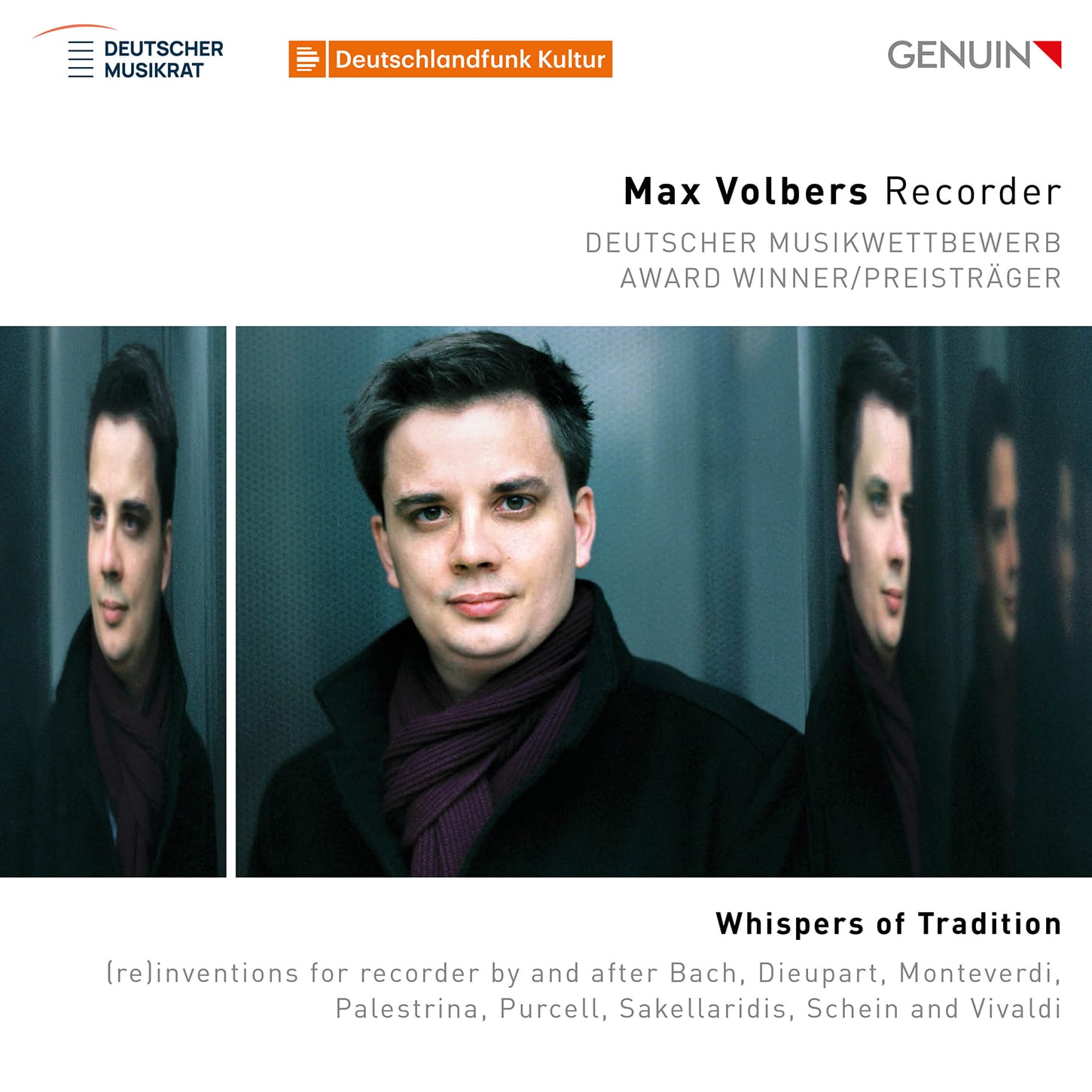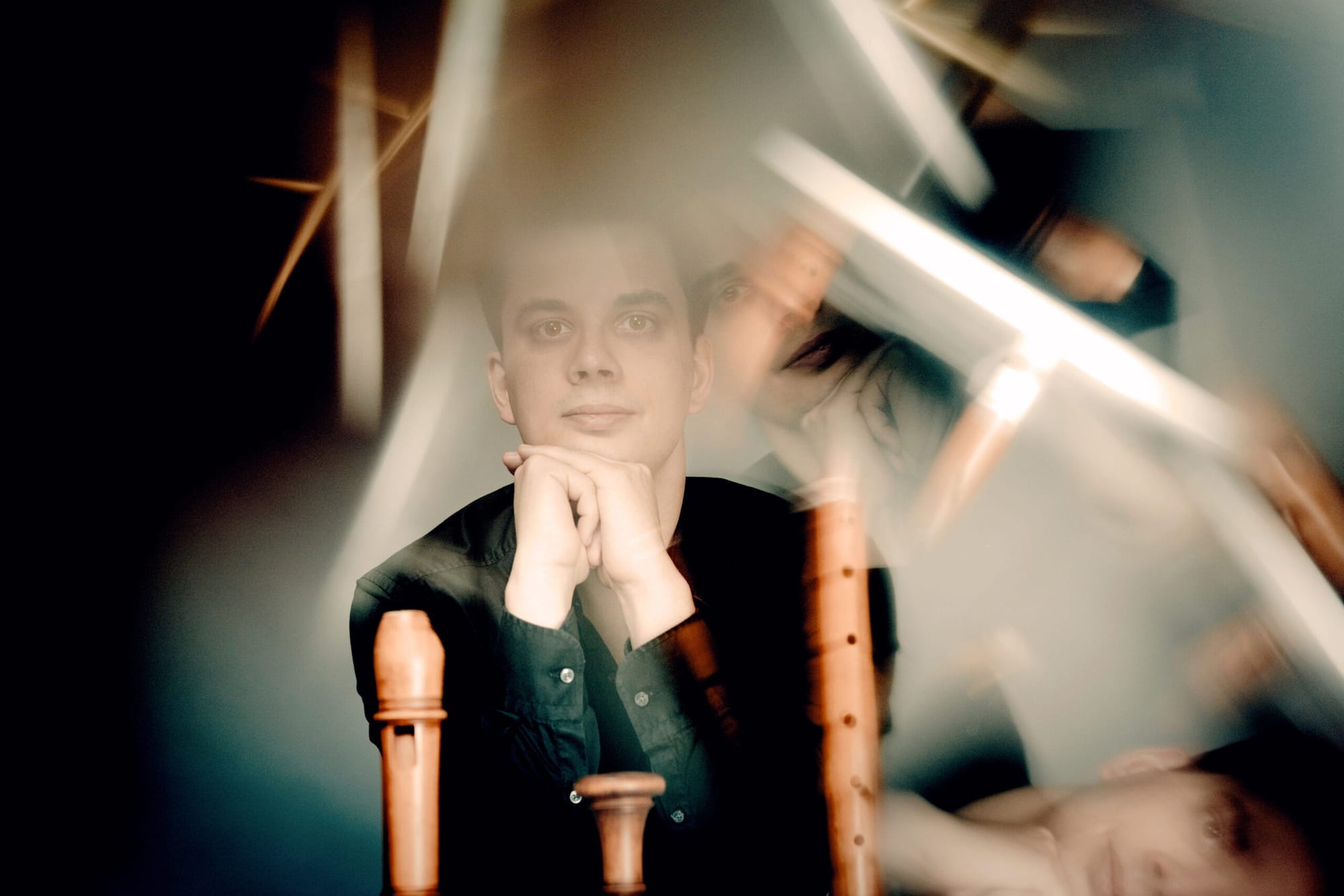Whispers of Tradition: (re)inventions for recorder
Many recorder discs have come my way; most disappointed me. This is the exception

Winner of the 2021 Deutscher Musikwettbewerb, Max Volbers carries forward the Baroque tradition of insatiable transcribing in his new disc. He is heard as recorder player on this disc, but is also an active harpsichordist, in keeping with the Baroque tradition of multi-instrumentalism. He teaches at the Salzburg Mozarteum.
Here's a trailer for Whispers of Tradition:
Even the title of the disc is itself a borrowing: from the music theorist John Hawkins (1719-1789), who is best known for his A General History of the Science and Practice of Music, which was published in five large volumes in 1776 and dedicated to King George III: his biography is fascinating. But how to construct a recorder concerto by Bach? How to create a “pasticcio concerto,” in other words? As Volbers points out in his booklet note, Bach was no stranger to the recorder. Think the Brandenburg Concertos Nos. 2 and 4, but also the Cantata BWV 96, Herr Christ, du ein'ge Gottes Sohn. You can hear the Suzuki performance of the recorder-encrusted Sinfonia to that cantata here on BIS, starting from 35"10 in this video below:
The Pasticcio Concerto begins with a transcription of the opening movement of Bach's Harpsichord Concerto in E-Major, BWV 1053 ( a piece played recently by Mahan Esfahani and the Britten Sinfonia at London's Wigmore Hall: see my review of that concert). It is fitting, again, that Bach's movement is itself a borrowing (from his own cantata BWV 169, Gott soll allein mean Herze haben). here, we hear Volbers' clear virtuosity
The central movement is a demonstration of the song-like side of Volbers' recorder. This is a transcription of the aria from BWV 169, “Stirb in mir, Welt,” and it works beautifully. Listen to the original first - Bernarda Fink as always superb here, with the Freiburg Baroque Ensemble under Petra Müllejans on Harmonia Mundi:
A Violin Concerto provides the material for the finale: that from the Concerto in E-Major, BWV 1042. Here's the original, played by a violinist who has been featured both in CD release and in concerts on Classical Explorer, in concert in Berlin, London and on disc in Beethoven and Stravinsky Concertos: Vilde Frang, here with the hr-Sinfonieorchester (the Frankfurt Radio Symphony Orchestra) with Philipps Herreweghe. This is the whole concerto; the finale begins at 13"09:
.. and here's Volbers, light, nimble, and in perfect accord with his players:
When I say “with his players,” they are listed individually as opposed to being allocated a composite name, but I do notice the excellent viola da gambist Robert Smith as being among their number, a musician we have covered a number of times. he is a master of his instrument, as you can hear in his Bach Gamba Sonatas, and in his recording of music by Marin Marais.

What comes next is as delightful as it is extraordinary. It is Volber's own Sonata sopra “Hor che 'l ciel e la terra,” on a late (Book 8, SV 147) madrigal by Monteverdi (alas not one heard at I Fagiolini's recent Wigmore Monteverdi Monday lunchtime concert). Here's the original, in a terrific live performance by Les Cris de Paris under Geoffroy Jourdain. And here's Volbers and friends, in a realisation that, as Volbers says, could be by Dario Castello (c 1600-1631) or Biagio Marini (1594-1663); note I was very much taken by Castello, both live courtesy of Christophe Rousset and Les Talens Lyriques at Ton Koopman's festival Itinéraire Baroque, and in the Academy of Ancient Music's recording of the First Book of Sonate Concertate in Still Moderno. Here's Volbers:
Volbers is very clear in his methodology: he uses techniques of diminution (ornamentation) found in Giovanni Battista Bovicelli's treatise Regole, passaggi di musica, madrigali et motetti passeggiati, Venice, 1594. There is no article on Wikipedia about Bovicelli in English, but there is one in German, and you can view the entire treatise here. And here's how Volbers applies it to Palestrina's Pulchra es anima mea: Here's the original, courtesy of The Sixteen:
.. and here's a sample embellishment of that piece by Francesco Rognoni (second half 16th century - died after 1626) performed by Capriccio Stravagante on the Paradize label:
.. and finally here's Vo,bers', which seems to me to maintain the spiritt of the original perfectly. Volbers is joined by Elizabeth Wirth, Felix Gulschi and Jonathan Volbers, recorders. This is a real highlight of the disc; it is simply exquisite. Frankly, I found myself wishing it could go on forever (it only lasts 4"42):
The recorder reperoire tends to sit in the Baroque era or before, or the modern age. So it is we move to the present century, and to Please enter the underground, a 2020 piece by Thanos Sakellaridis (born 1995) for two Paetzold recorders and writen expressly for Volbers and Elisabeth Wirth. As Volbers explains, there is something of a “techno-groove” about this piece; to my ears there is something of the sounds of an avian paradise held within a concrete jungle. All credit to the player for their expertise in multiphonics here:
Volbers' Fantasia on Mr Purcell's Chacony from The Fairy Queen is a lot of fun - he certainly has fun, too, as do his continuo group, digging in on those chords while the recorder goes flying. There are some pretty imaginative scales in there, too. You'll know the Purcell original, for sure:
... and so to Charlies Dieuport. JSB himself copied out Dieupart's harpsichord Suites (and indeed Bach’s First English Suite nods to Dieupart). Bach's copyist activities seem to form the main part of Dieupart's fame, if textbooks are to be believed. Dieupart moved to England from France, finding little favour at the French court. But he was a renowned harpsichordist as well as jobbing composer (he worked at Drury Lane Theatre). Luckily, his suites have returned to favour, and there are several fine recordings. The Sarabande of the Troisième Suite is beautiful, and the performance here superb:
t
Alexander von Heißen is the fine harpsichordist: listen to the “Menuet Serieux,” a solo movement in which von Heißen articulates perfectly:
If you do want a complete Dieupart Suites recording, though, the one on the Stradivarius label is excellent: Sergio Balestracci on Baroque flute. with a continuo section including theory (Massimo Leonardo), viola da gamba (Guido Malestracci) and harpsichord or organ (Ottavio Dantone). Here's their Ouverture, and below that is Volbers':
More diminution, this time Palestrina's Vesiva e colli, a piece that became a template for many Italian descriptive pieces in the style of the narrative chanson of the Paris school. Various composers and theorists have provided diminutions, including Bassano. Here's Volmers (for a performance of Palestrina' original, I would recommend La Pedrina's preformance on their Glossa disc Regina Bastarda linked on iDagio below). Volmers’ diminution is based on the work of Francesco Rognoni:
In contrast to diminution, sometimes simple is best, as in the recording of Johann Schein's motet, Lehre und bedenken; the opening of the Vivaldi Concerto RV 312 (per Flautino in G) comes as a breath of fresh air. RV 312 began as a recorder concerto but at one point Vivaldi transferred the solo line to violin. Volbers' reconstruction is a fine one (there is another by Jean Cassignol). Here's Volbers in the beautiful Larghetto, his ornamentation again exemplary:
... and here, for comparison, is a performance of the piece performed on violin by Duilio Massimo Galfetti (violin), with I Barocchisti and Diego Fasolis:
A phenomenal disc, then. Many recorder discs have come my way in my time; most disappointed me. This is the exception - there is so much to enjoy here, and so much to learn, too.
This disc is available via Amazon here; streaming links below. For some reason, the Dieupart/Balestracci isa hefty £25.73 on Amazon, so streaming links are provided for that, also.



